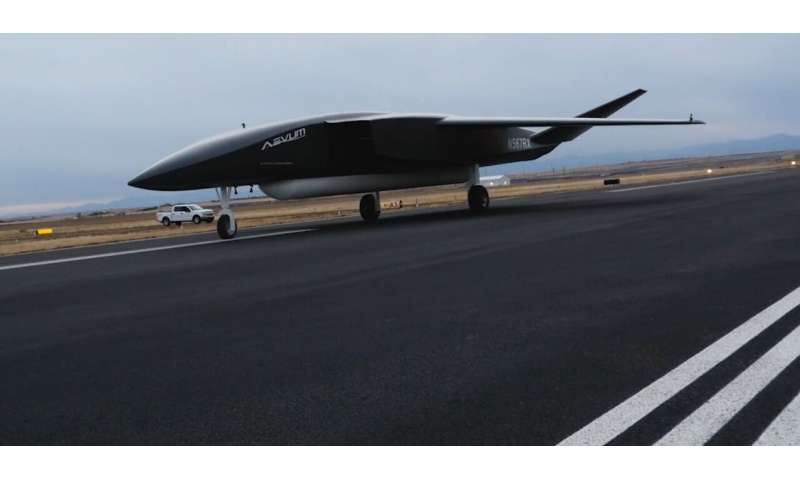by Peter Grad , Tech Xplore

We all have images in our mind of rocket launches from Cape Canaveral Air Force Station hurtling astronauts into space and satellites into orbit.
But those launches may be a thing of the past as a new generation of drones that can do the same job cheaper, safer and better steps into play.
Alabama-Based Aevum unveiled its Ravn X Autonomous Launch Vehicle Wednesday that it says is the world's largest unmanned aircraft system.
The Ravn X fleet, with aircraft at 80 feet long and 60 feet wide, can deliver satellite payloads with precision accuracy every 180 minutes around the clock. Best of all, company officials say, it can be done safer than current space delivery systems because the crafts are unmanned.
"Aevum is completely reimagining access to space," said Jay Skylus, founder and CEO of Aevum. "The current definition of rocket science doesn't work for us. With Aevum, everyone will be able to say, 'It is rocket science and I can do it.' Aevum is pushing logistics to the next generation with software and automation technologies."
The Ravn X does not require a runway longer than one mile, allowing it to take off and return to remote areas lacking formal airports. The drones take off and land without human assistance.
The vehicles are also economical: 70 percent of each Ravn X is reusable after launch. The company says it is aiming to build drones that are ultimately 95 percent reusable in the near future.
Weather does not appear to be a critical factor. Except for rare, extreme conditions, the drones can be launched under bad weather conditions that would prevent flight by current satellite delivery systems.
The autonomous system takes into account not just weather but other key variables such as air traffic congestion, payload weight, destination and ground crew scheduling.
Skylus sees a higher mission with the creation of the Aevum Autonomous Launch System.
"U.S. leadership has identified the critical need for extremely fast access to low Earth orbit. We're faster than anybody," he said. "To me, space is merely a vantage point from which the next generation can commit global progress. Aevum will shorten the lead time of launches from years to months, and when our customers demand it, minutes. This is necessary to improve lives on Earth. This is necessary to save lives."
Two competitors, the Virgin Group, home of Virgin Airlines, and Stratolaunch, founded by the late Microsoft co-founder Paul Allen, launched their own satellite-delivery companies offering mid-air satellite launch systems over the past decade. But unlike the Ravn X, those aircraft require onboard pilots to assist in operations. The Ravn X is fully autonomous.
According to a company summary of the project, the Ravn X, unlike ground launch or air launch, "involves a global, fully-autonomous, self-flying, self-managing, self-operating intelligent system of systems, called the autonomous launch architecture, working in concert to deliver payloads from any terrestrial origin to any space destination in low Earth orbit."
The Ravn X already has customers lined up for the first launches set to begin late in 2021. Twenty missions over nine years have been scheduled with the U.S. Air Force Space and Missile Systems Center. And the U.S. Space Force has signed a $5 million contract for the launch of its ASLON-45 experimental satellite system.
Explore further European space rocket launch fails minutes after takeoff
More information: www.businesswire.com/news/home … Out-Ravn-X-The-World%E2%80%99s-First-Autonomous-Launch-Vehicle-and-the-Largest-Unmanned-Aircraft-System-UAS
www.aevumlaunch.com/
© 2020 Science X Network
No comments:
Post a Comment